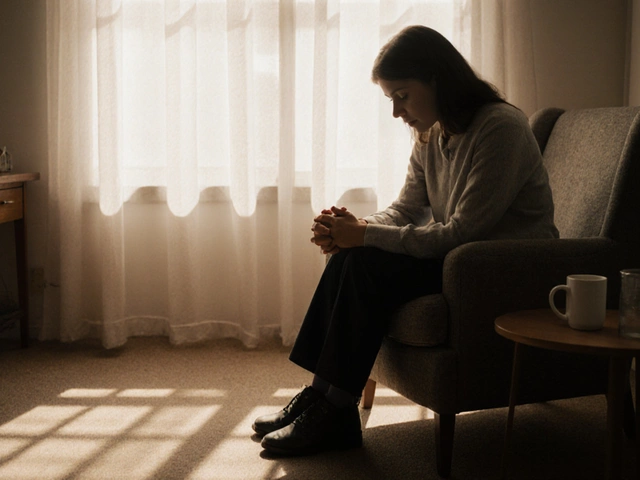If you’ve ever sat across from your therapist and hesitated before speaking, you’re not alone. Therapy is supposed to be a safe space for spilling all your secrets, right? So why do people still wonder what they “can’t” tell their therapist? Turns out, there are some nuanced reasons—legal, personal, and even strategic—behind deciding what stays unsaid. Sometimes the stuff we’re supposed to talk about is the exact thing that makes us clam up, but the reality here might surprise you.
Why People Hide Things from Their Therapists
People rarely talk about how tough it is to say certain things out loud, even to a professional. You might feel embarrassed about a secret or guilty over something you did. Maybe you worry about being judged or are scared your therapist will see you differently. The fear of your personal info getting out or being misunderstood can lock your mouth shut, even when you want to open up. According to the American Psychological Association, nearly one out of three people admits they’ve kept important details from their therapist at some point. That could be as simple as softening tough feelings about family, or as serious as hiding thoughts of self-harm.
Sometimes, it’s just about trust. Building trust with a stranger takes time, even if they're trained to guide you. Add in cultural stigma around mental health, or anxiety from past experiences, and hiding things actually makes sense. Some people hold back because they’re worried about what will go into the therapist’s notes, especially if they're worried about work, immigration, or custody battles. Others pull back when the therapy relationship feels transactional: “Why should I share this if I don’t think the therapist cares?” This is a valid feeling, and it plays a bigger role in therapy than people think.
Stigma also fuels silence. You grew up hearing “don’t air your dirty laundry.” Maybe you were taught some topics just aren’t discussed. Studies from the National Institute of Mental Health show that fear of stigma is a leading reason people drop out of therapy, or struggle to start. All these factors combine, so folks get stuck in a cycle of wanting help but not wanting to reveal what’s really bothering them.

The Legal and Ethical Side: When Silence Isn’t an Option
Here's the straight-talk: therapists are trained to keep your secrets, but there are lines they can't cross. The law and their ethical code make sure of it. But most folks overestimate what these boundaries are. Therapists don’t call the police or your boss if you confess to having a bad week or even making bad choices. Their role is to listen, not judge or punish. Still, there are some very specific things therapists absolutely must report if you say them.
- Danger to Self or Others: If you tell your therapist you’re seriously planning to hurt yourself or someone else, they’re required by law to act. Not all suicidal thoughts trigger this, only if you have a real plan and intent. It’s about your safety or the safety of others.
- Child Abuse or Elder Abuse: If you reveal information that suggests a child or vulnerable adult is being abused or neglected, therapists have to report it. This isn’t negotiable, and it’s meant to protect those who can’t protect themselves.
- Subpoena or Legal Order: Rare, but sometimes courts can demand a therapist’s records or testimony. However, this is usually only in extreme cases, and there are often protections in place to keep therapy as private as possible.
People worry that talking about drug use or past illegal activity will land them in trouble. In reality, unless it’s ongoing abuse or a direct threat, therapists typically aren’t required to report it. Confessing to a crime from years ago—unless it reveals an ongoing threat—stays confidential. On the other hand, talking about wanting to commit a crime, or making threats, can cross the line and might need action.
If you’re not sure, ask your therapist directly what their boundaries are. Most are happy to explain their legal and ethical limits before you ever share a word. They want you to feel as safe as you can. Transparency upfront can help lower your guard.
| What You Say | Will They Share? | Legal/Ethical Duty? |
|---|---|---|
| I’m depressed, want to quit my job | No | No |
| I stole candy as a teen | No | No |
| I want to hurt myself (with a plan) | Maybe | Yes |
| Someone is abusing a child | Yes | Yes |

Secrets That Can Undermine Your Healing (But Don’t Legally Have To Be Shared)
Here’s the tough reality: the stuff you hide doesn't just disappear. When you keep certain things from your therapist, you’re not really hiding from them. You’re hiding from the healing process. Therapy only works if you give it something real to work with. You might be shocked to hear psychologists have found that clients who are totally honest progress up to 40% faster. But that doesn’t mean you have to blurt out every thought or memory on day one.
People hide different things. Some avoid talking about attraction to their therapist, some hide shameful habits, and others block out specific traumas. You might keep quiet about financial trouble, sexuality, or embarrassing health stuff. One common surprise? Sitting on anger—especially anger at the therapist or about the therapy itself. This hidden resentment can create a big wall that makes therapy drag. But therapists aren’t mind readers; if you don’t tell them, they most likely won’t guess.
So, should you share absolutely everything? Here’s a trick: if something keeps popping up in your mind during sessions, that’s a sign it might need to be aired out. If you’re too scared to say it, try writing it down, or tell your therapist, “I’m scared to tell you something.” That honesty often opens doors to better trust, and 9 times out of 10, your therapist won’t be shocked. They’ve heard plenty.
- Don’t want to talk about something yet? Say so. Transparency builds trust.
- Worried you’ll be judged? Therapists are trained to handle tough stuff neutrally.
- Think you’ll upset your therapist? That’s their job; they can handle it.
Some clients are nervous about therapy notes and privacy. By law, your records are protected by HIPAA in the USA and similar privacy laws worldwide. Only you (or someone you let) can access detailed therapy notes. If you need extra privacy, ask what gets recorded or if you can request sensitive things to stay off the official file.
Sometimes, the most helpful move is just to say something like, “I’m afraid to share this.” Therapists work best with honesty, not just big reveals, but tiny clues you leave along the way.
The bottom line? There are very few things you absolutely shouldn’t say in therapy unless you’re not ready or it’s part of a legal issue. But the stuff you keep locked up is often the place where you need the most healing. Therapy is about letting go of secrets at your pace, not keeping them forever. If the secret feels too big to share, you don't have to tackle it all at once. Just naming that it exists is a big step.







